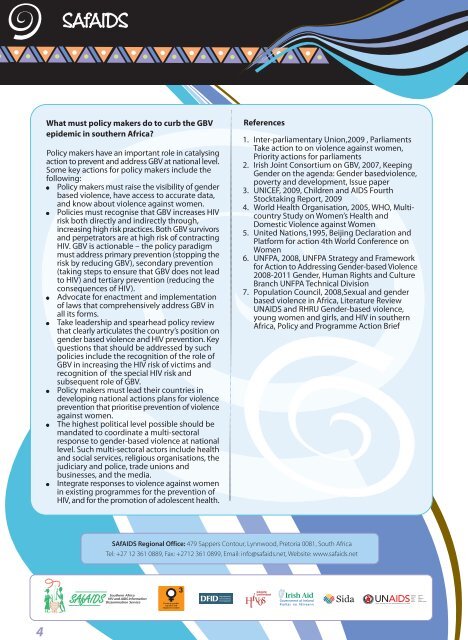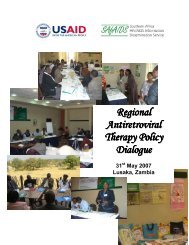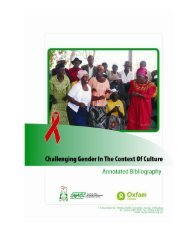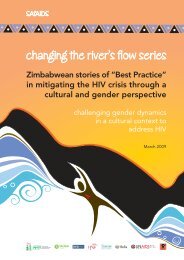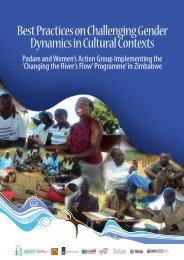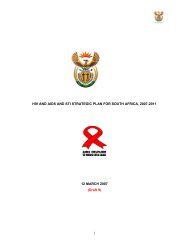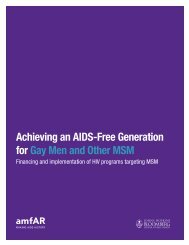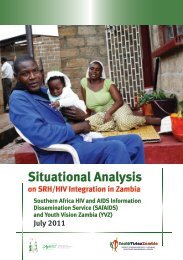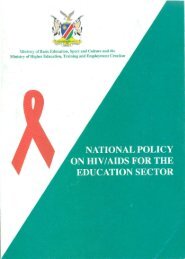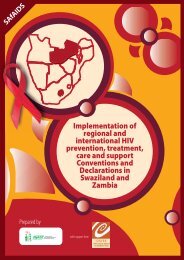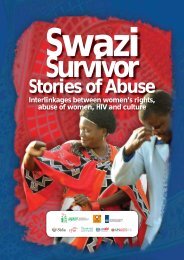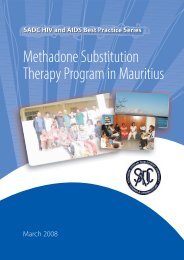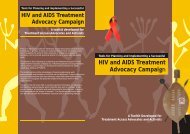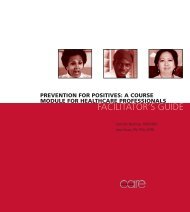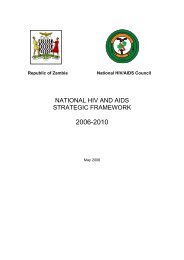Fact sheet on Gender based violence: A responsibility to ... - SAfAIDS
Fact sheet on Gender based violence: A responsibility to ... - SAfAIDS
Fact sheet on Gender based violence: A responsibility to ... - SAfAIDS
You also want an ePaper? Increase the reach of your titles
YUMPU automatically turns print PDFs into web optimized ePapers that Google loves.
4<br />
What must policy makers do <strong>to</strong> curb the GBV<br />
epidemic in southern Africa?<br />
Policy makers have an important role in catalysing<br />
acti<strong>on</strong> <strong>to</strong> prevent and address GBV at nati<strong>on</strong>al level.<br />
Some key acti<strong>on</strong>s for policy makers include the<br />
following:<br />
Policy makers must raise the visibility of gender<br />
<strong>based</strong> <strong>violence</strong>, have access <strong>to</strong> accurate data,<br />
and know about <strong>violence</strong> against women.<br />
Policies must recognise that GBV increases HIV<br />
risk both directly and indirectly through,<br />
increasing high risk practices. Both GBV survivors<br />
and perpetra<strong>to</strong>rs are at high risk of c<strong>on</strong>tracting<br />
HIV. GBV is acti<strong>on</strong>able – the policy paradigm<br />
must address primary preventi<strong>on</strong> (s<strong>to</strong>pping the<br />
risk by reducing GBV), sec<strong>on</strong>dary preventi<strong>on</strong><br />
(taking steps <strong>to</strong> ensure that GBV does not lead<br />
<strong>to</strong> HIV) and tertiary preventi<strong>on</strong> (reducing the<br />
c<strong>on</strong>sequences of HIV).<br />
Advocate for enactment and implementati<strong>on</strong><br />
of laws that comprehensively address GBV in<br />
all its forms.<br />
Take leadership and spearhead policy review<br />
that clearly articulates the country’s positi<strong>on</strong> <strong>on</strong><br />
gender <strong>based</strong> <strong>violence</strong> and HIV preventi<strong>on</strong>. Key<br />
questi<strong>on</strong>s that should be addressed by such<br />
policies include the recogniti<strong>on</strong> of the role of<br />
GBV in increasing the HIV risk of victims and<br />
recogniti<strong>on</strong> of the special HIV risk and<br />
subsequent role of GBV.<br />
Policy makers must lead their countries in<br />
developing nati<strong>on</strong>al acti<strong>on</strong>s plans for <strong>violence</strong><br />
preventi<strong>on</strong> that prioritise preventi<strong>on</strong> of <strong>violence</strong><br />
against women.<br />
The highest political level possible should be<br />
mandated <strong>to</strong> coordinate a multi-sec<strong>to</strong>ral<br />
resp<strong>on</strong>se <strong>to</strong> gender-<strong>based</strong> <strong>violence</strong> at nati<strong>on</strong>al<br />
level. Such multi-sec<strong>to</strong>ral ac<strong>to</strong>rs include health<br />
and social services, religious organisati<strong>on</strong>s, the<br />
judiciary and police, trade uni<strong>on</strong>s and<br />
businesses, and the media.<br />
Integrate resp<strong>on</strong>ses <strong>to</strong> <strong>violence</strong> against women<br />
in existing programmes for the preventi<strong>on</strong> of<br />
HIV, and for the promoti<strong>on</strong> of adolescent health.<br />
References<br />
1. Inter-parliamentary Uni<strong>on</strong>,2009 , Parliaments<br />
Take acti<strong>on</strong> <strong>to</strong> <strong>on</strong> <strong>violence</strong> against women,<br />
Priority acti<strong>on</strong>s for parliaments<br />
2. Irish Joint C<strong>on</strong>sortium <strong>on</strong> GBV, 2007, Keeping<br />
<strong>Gender</strong> <strong>on</strong> the agenda: <strong>Gender</strong> <strong>based</strong><strong>violence</strong>,<br />
poverty and development, Issue paper<br />
3. UNICEF, 2009, Children and AIDS Fourth<br />
S<strong>to</strong>cktaking Report, 2009<br />
4. World Health Organisati<strong>on</strong>, 2005, WHO, Multicountry<br />
Study <strong>on</strong> Women’s Health and<br />
Domestic Violence against Women<br />
5. United Nati<strong>on</strong>s,1995, Beijing Declarati<strong>on</strong> and<br />
Platform for acti<strong>on</strong> 4th World C<strong>on</strong>ference <strong>on</strong><br />
Women<br />
6. UNFPA, 2008, UNFPA Strategy and Framework<br />
for Acti<strong>on</strong> <strong>to</strong> Addressing <strong>Gender</strong>-<strong>based</strong> Violence<br />
2008-2011 <strong>Gender</strong>, Human Rights and Culture<br />
Branch UNFPA Technical Divisi<strong>on</strong><br />
7. Populati<strong>on</strong> Council, 2008,Sexual and gender<br />
<strong>based</strong> <strong>violence</strong> in Africa, Literature Review<br />
UNAIDS and RHRU <strong>Gender</strong>-<strong>based</strong> <strong>violence</strong>,<br />
young women and girls, and HIV in southern<br />
Africa, Policy and Programme Acti<strong>on</strong> Brief<br />
<strong>SAfAIDS</strong> Regi<strong>on</strong>al Office: 479 Sappers C<strong>on</strong><strong>to</strong>ur, Lynnwood, Pre<strong>to</strong>ria 0081, South Africa<br />
Tel: +27 12 361 0889, Fax: +2712 361 0899, Email: info@safaids.net, Website: www.safaids.net


